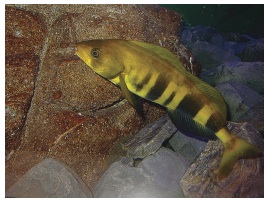Adak Pushes Hard for Access to Pollock

Wednesday, December 04 2013
Recently, Alaska’s Board of Fisheries set up an experimental harvest in the Aleutian Islands that might have benefited small communities like Adak. But as KUCB’s Lauren Rosenthal reports, Adak had its eyes on a much bigger prize.
Atka mackerel move fast and live low. They’re strong swimmers that like to hide along rocky sea bottoms.
In the Aleutians especially, they can be tough to catch. But Orville Huntington, a member of the Alaska Board of Fisheries from Huslia, thought it was worth a shot.
At a meeting this fall, Huntington told the board he supported a plan to shift a tiny amount of Atka mackerel quota into the Aleutians. He said it could be good for fishermen, and for residents of communities like Adak.
Huntington: "Seems to me that this does give an opportunity for Alaskan citizens to at least try something new."
The board bumped up the catch amount, to encourage more fishermen to participate, and approved the new small-boat harvest for mackerel.
It seemed like good news for Adak. The island’s economy is dependent on its seafood processing plant, and they’ve wanted to branch out for a while -- just not into mackerel.
Dave Fraser is a board member of the nonprofit Adak Community Development Corporation, or ACDC.
He helped ACDC campaign to get the new mackerel fishery struck down -- and to improve their chances of getting a federal pollock harvest approved.
Fraser: "We were concerned that shifting 10 percent of the mackerel quota into critical habitat would have had consequences in the ability of NMFS to approve a pollock fishery in the Aleutians."
Mackerel and pollock are both big food sources for Steller sea lions -- an endangered species that the National Marine Fisheries Service has gone to great lengths to protect. For years, they closed down commercial fishing in big swaths in the Aleutians.
But that might change. NMFS has been working a court-ordered study of their sea lion protections this year.
As part of that, they’ve been examining ways to safely open up more fishing grounds in the Aleutians -- including the spot where Adak wants to fish a small amount of pollock quota.
Fraser says they got the allocation years ago, for the purpose of helping Adak grow.
Fraser: "If it’s opened, that would allow access to roughly 19,000 tons of pollock. That would be a huge benefit to The [Aleut] Corporation and to the community of Adak."
That’s because even a small amount of pollock is worth a lot of money -- more than the mackerel fishery that the state set up.
Even though NMFS is considering more fishing right now, it wasn’t clear if they’d support two new fisheries on sea lion food sources -- mackerel and pollock -- in an area that’s still important habitat.
So in late November, ACDC filed a petition with the Board of Fish to take back their mackerel vote. The board called an emergency meeting, and asked Nicole Kimball, the state's federal fish coordinator, to clarify.
Kimball told the board that NMFS probably wouldn’t want to allow fishing for both mackerel and pollock:
Kimball: "So for instance, this pollock fishery that is potentially on the table and potentially could be allowable under this new biological opinion, may not be on the table as a worst case scenario under this action."
Several Board of Fish members said it wasn’t their intent to preclude a pollock harvest, and it wasn’t worth it to put mackerel first.
After consulting with a lawyer, they voted unanimously to take back the mackerel fishery.
Fraser says there’s been no harm done to ACDC’s goal, as far as they know.
Fraser: "It was an action by the board with the best of intentions and unintended consequences."
Now that they’ve ironed out what new fishery gets precedent in the area, Adak still has to wait for NMFS to release a draft of their biological study on sea lion protections. That should arrive in late winter.
Then, Adak will have a better idea of if when they might be able to catch pollock -- a resource they’d still be sharing, with the sea lions.
Correction: An earlier version of this story misidentified Nicole Kimball as a NMFS employee. She is employed by the Alaska Department of Fish and Game as a federal fisheries coordinator.



